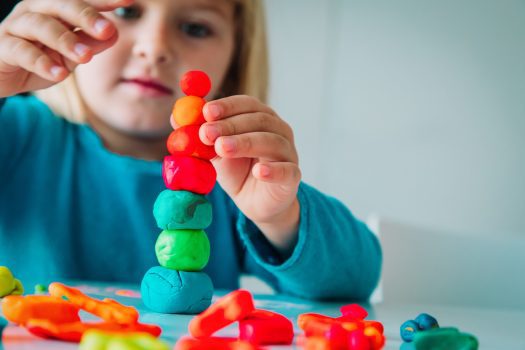Emotional regulation is our ability to control and effectively manage our emotions. It’s a process that we experience, rather than an end goal, and we all fluctuate through different states or zones throughout the day.
The aim of emotional regulation is to be within the green zone, or the just right zone, where we feel calm, happy and in control. Making sure we’re in the green zone is a skill that develops over time, and one that is dependent on our environment and needs.
It doesn’t matter your age; we all need different levels of support to help us regulate our emotions. For example, babies need a safe and supportive adult in their life to co-regulate, whilst most adults also need an element of co-regulation in their life. Children are no different.
What is emotional regulation in children, and what does it look like?
The ability to regulate emotions starts when children are babies and continues until adulthood. It develops rapidly during a child’s early years, which is why early intervention is so important.
Children who are unable to regulate their emotions may find their emotional reactions to events or feelings outside the range typically accepted. They might also avoid difficult emotions or behave in an impulsive manner, such as lashing out, when their emotions are out of control.
Ability Action Australia’s team of accredited exercise physiologists can support children to regulate their emotions and find their just right zone, helping them stay in control and thrive both at home and at school.
How can exercise physiology support emotional regulation?
Exercise physiology can be an effective treatment to support children deal with their emotions. It can help them build capacity to self-manage by participating in physical activities and strategies.
Senses play a big part in emotional regulation, and understanding when to take action can make a huge difference in a child’s ability to regulate their emotions. Unfortunately, it can be difficult to describe senses to children, and even more difficult for children to identify them.
To help, our team works with children to make sure they understand their senses in other ways. They can also teach children to recognise sensations when they appear and match them with appropriate activities that can support emotional regulation.
Exercise physiologists can also work closely with other allied health professionals to strengthen regulation strategies. Our teams are all about collaboration, not only with other professionals who have their own unique skills and experience, but also working with the child’s family and support network.
We’re aware that, in comparison to their parents or carers, we only see participants for short periods of time in their lives. That’s why we’re always keen to work with the child’s close support network to provide activities and methods for regulation that will support them every day.
How to help a child regulate their emotions with paediatric exercise physiology
Ability Action Australia has been supporting an eight-year-old boy with autism who struggles to regulate his emotions. Our team has been teaching him the zones of regulation – coloured zones that represent emotions – so he can better express his needs and develop his ability to cope with his emotions.
Our exercise physiologists have worked closely with the child, his teacher and his family to develop a sensory box filled with physical activity cards based on equipment he has available to him. These activity cards are matched to the coloured zones he has been learning.
The child can now use a colour to express what he needs whilst he learns his emotions. Whichever colour he chooses will provide him with a choice of exercises or activities designed to calm him down. For example, if he feels angry, he points to red. He can go to his sensory box, select a red card and choose one of multiple activities – such as making something with Playdough – designed to bring him back to the calming green zone.
Talk to us for support with a range of needs
Paediatric exercise physiology isn’t just about physical wellbeing – in many cases, it can be applied to support your child in other areas too. Emotional regulation is just one of the areas where paediatric exercise physiology can help your child achieve their goals and reach developmental milestones.
Whether you’re just getting started with an NDIS plan, evaluating your therapy options, or would like to know more about how we can help your child reach their goals, call us to speak to our friendly Ability Action Australia concierge service. They’ll be happy to help you.
Phone us on 1800 238 958 or email hello@abilityactionaustralia.com.au


